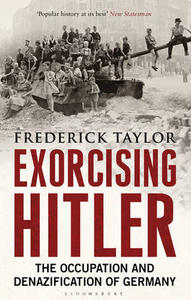Take a photo of a barcode or cover
Was not so much written about the DeNazifying process but more so about how the Allies had to govern Germany post war
Taylor sheds light into a time and a place and a struggle that mattered little in the rest of the world: the plight of Germany between the end of World War 2 and the creation of West and East Germany. No one sympathized with the land of Hitler, no one cared about starvation, rape, malnutrition, hardship.
What the world did care about was finding Nazis, and the surviving Germans played a game of cat-and-mouse. The world didn't want to give; Germany didn't necessarily want to turn over its own people to the tribunals.
Taylor does a pretty good job tiptoeing through a history that still leaves a taste of bitterness 70 years later. The book lags when it gets caught up in the bureaucratic rigamarole and posturing that went on between the four allied sides. It soars when Taylor brings in the experiences of real Germans from that era.
What the world did care about was finding Nazis, and the surviving Germans played a game of cat-and-mouse. The world didn't want to give; Germany didn't necessarily want to turn over its own people to the tribunals.
Taylor does a pretty good job tiptoeing through a history that still leaves a taste of bitterness 70 years later. The book lags when it gets caught up in the bureaucratic rigamarole and posturing that went on between the four allied sides. It soars when Taylor brings in the experiences of real Germans from that era.
This book is much more about the conquest and allied occupation of Germany than about the process of denazification, which it draws mostly from Perry Biddiscombe, without much of the nuance. What he offers that Biddiscombe doesn't is many colorful passages drawn from people's diaries and letters, so it's much more interesting to read and is less academic. The book's main flaw is its anti-left bias, which can be noted in dismissive commentary about even former SPD activists as "vengeful" in contrast to the somehow always wrongly accused "regular" Germans. Like Biddiscombe, he criticizes the Frankfurt School role in American denazification, but doesn't really discuss them in any depth. The author does include some important passages about the anti-Semitism that caused occuaption governments to be more favorable to former Nazis than Jewish refugees, but the conservative approach means the author can't fully explain why and how this was beyond describing such individual "bad" people as Patton. It would have been interesting if he had included the post-war experience of someone like Fritz Bauer, the Jewish SPD activist who prosecuted the Auschwitz trial in 1965, and who helped the IDF capture Eichmann (secretly because of the Nazis w/in the German judiciary at the time). In the epilogue, he mentions the importance of both the Eichmann and Auschwitz trials for the real beginning of "regular Germans" examining the Nazi past, but doesn't mention the German (Jewish, socialist) person in government who made both happen! He also fails to include much about the rehabilitation and reeducation efforts of the period that are written about by scholars such as James Tent. This book began reminding me of those accounts that blame Trumpism on liberals or leftists who "go too far" - as if denazification is what made people sympathetic to Nazism, instead of their being Nazis or sympathetic to Nazism in the first place. As the Frankfurt school scholars had described Nazism as like a "virus" that had spread throughout German society, not just an imposition from the top, they were correct. That's what made denazification difficult, and it explains why many people resisted and resented the process, and why the left thought denazification didn't go far enough.
slow-paced
Good introductory overview to the Allied occupation and early Denazification. Focused more on ground I was familiar with (1944-45 and the final conquest of Nazi Germany) than I was hoping for, but good deep dives into the different experiences of Denazification in the four occupation zones.
After reading an epic amount about Nazi Germany this year, the thing that I kept searching for was something that broke out what the allies did after they occupied. This book did the trick, it outlines the politics and the social aspects of the occupation and backs up the harshness of the Russians at the time that were only briefly mentioned in other titles I read.
When you compare how our leaders then handled things compared to how we handled Iraq it becomes quite striking.
When you compare how our leaders then handled things compared to how we handled Iraq it becomes quite striking.
The aftermath of war is always messy and unexpected--even when planned for. Taylor examines many aspects of the end of World War Two. I would have liked a bit more about the actual denazification process. Although this is in the subtitle, I didn't feel like he tackled it enough. Good read.


